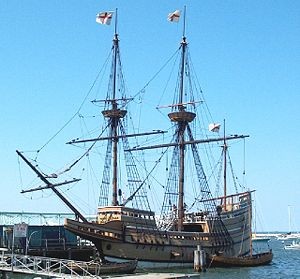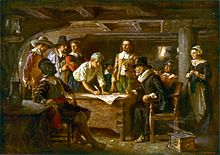Whom Shall We Thank This Thanksgiving?
 This fall we stood on the tip of Cape Cod on a wet, cold day and watched the Mayflower II bob offshore. We also peered over a railing at Plymouth Rock, where the Pilgrims first stepped ashore. The day we were there, a Northeaster was blowing hard, rocking everything, so we didn’t stay long. The day was much darker than the photo to the left!
This fall we stood on the tip of Cape Cod on a wet, cold day and watched the Mayflower II bob offshore. We also peered over a railing at Plymouth Rock, where the Pilgrims first stepped ashore. The day we were there, a Northeaster was blowing hard, rocking everything, so we didn’t stay long. The day was much darker than the photo to the left!
The Pilgrims probably experienced the same type of weather as we did. They arrived at Plymouth on November 21, 1620, after spending 63 storm-tossed days in the hold of a cargo ship. There was no warm hotel room awaiting them at the end of their journey.
That first winter, about half the 102 Pilgrims died of cold, disease and starvation. But they also found Native American friends, such as the English speaking Squanto, who taught them how to survive in the new land. The next year, in November 1621, they held the first Thanksgiving feast. Their good neighbors were the honored guests at the three-day celebration.
It is popular today to take a jaded view of the Pilgrims and make fun of their shortcomings. However, it was Theodore Roosevelt who said it’s not the critic who counts, but the man in the arena. www.goodreads.com/quotes/7-it-is-not-the-critic-who-counts-not-the-man. I doubt any of the critics have come close to enduring the hardships faced by the Pilgrims, nor have they said or done much that will have a positive influence on the world.
Still, the critics are rewriting the history books, avoiding the real reasons the Pilgrims came to America. How will they ignore the Pilgrims’ objectives, which are clearly found in the Mayflower Compact, the first governing document of Plymouth Colony?
 The Mayflower Compact is just four sentences long. The Pilgrims wrote it on the boat before they went ashore. Yet it has provided direction for this country for almost 400 years; The U.S. Constitution was based on the general principles found in it. Here it is:
The Mayflower Compact is just four sentences long. The Pilgrims wrote it on the boat before they went ashore. Yet it has provided direction for this country for almost 400 years; The U.S. Constitution was based on the general principles found in it. Here it is:
In the name of God, Amen. We, whose names are underwritten, the loyal subjects of our dread Sovereign Lord King James, by the Grace of God, of Great Britain, France, and Ireland, King, defender of the Faith, etc.
Having undertaken, for the Glory of God, and advancements of the Christian faith and honor of our King and Country, a voyage to plant the first colony in the Northern parts of Virginia, do by these presents, solemnly and mutually, in the presence of God, and one another, covenant and combine ourselves together into a civil body politic; for our better ordering, and preservation and furtherance of the ends aforesaid; and by virtue hereof to enact, constitute, and frame, such just and equal laws, ordinances, acts, constitutions, and offices, from time to time, as shall be thought most meet and convenient for the general good of the colony; unto which we promise all due submission and obedience.
In witness whereof we have hereunto subscribed our names at Cape Cod the 11th of November, in the year of the reign of our Sovereign Lord King James, of England, France, and Ireland, the eighteenth, and of Scotland the fifty-fourth, 1620.
This Thanksgiving, we would do well to remember the beginning of our great nation. America remains a beacon of light to the rest of the world. Let’s shrug off the pride we take in our own accomplishments and humbly give God the glory for what he has accomplished through us.
There are a number of good books on the topic of Early America. The Light and the Glory by Peter Marshall and David Manuel, which was first published in 1977, is an enlightening read and is available online.

